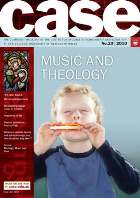The song-shaped soul…

“Why do Christians sing?” This question is, of course, a subset of a larger question, “Why do human beings sing?” According to the Scottish composer and hymn writer John Bell, “We sing because we can.” It is something we can do—like walking, thinking, climbing the north face of the Eiger, dancing, reading, or doing the back walkover on the high beam. It’s a human thing, something within the human potential.
People sing when they’re happy, and when they’re sad. We sing to tell stories. We sing to learn. Some people sing because they’re in slavery, others sing because they’re free. We sing to put our babies to sleep, and we sometimes sing to keep ourselves awake.
But Dr. Steven Guthrie says that his university students almost always give the same answer when asked why people sing: “We sing to express our emotions.” For his students, “singing is a means of expression—a way of drawing out what is in us (that’s the ‘ex’ in ex-pression).” Music is simply a vehicle for self-expression.
This attitude is in sync with the broader sensibilities of our age which reduce music “almost entirely to entertainment, background and diversion.” Dr. Guthrie would agree, in some respects, that “music—like food, like sex, like friendship and a hundred other pleasures—is delightful.”
But singing can be more, especially for Christians. In a thought-provoking article entitled “The Song-Shaped Soul,” Dr. Guthrie argues that “singing can be a spiritual discipline,” an idea at odds with the contemporary cultural emphasis on personal pleasure and self-expression.
As a counterbalance, Dr. Guthrie suggests looking back to an early Church Father, Athanasius, for insight. In a letter to his friend Marcellinus, Athanasius passes on advice that he received from “a certain studious old man.”
Son, all the books of Scripture, both Old Testament and New, are inspired by God and useful for instruction [2 Tim 3:16], as it is written; but to those who really study it, the Psalter yields especial treasure.
Athanasius goes on to point out that, while Psalms has much in common with other Scriptures, its “special function is to utter songs.” Here, Dr. Guthrie tells us, we find the key to the significance of Psalms for Athanasius: “[T]he reason the Psalms are of such help in the spiritual life is precisely because they are not simply read or spoken, but sung.”
For Athanasius … the first and most important outcome of singing the Psalms is not ex-pression, but im-pression. In singing the Psalms the truth is not drawn out of but into the depths of one’s being.
[T]he first virtue of the Psalms is not that they allow me to express my emotions. Rather, by singing the Psalms it becomes possible for me to express Moses’ emotions, or David’s emotions as my own. And this potency, Athanasius suggests, arises from the sung character of the Psalms. Singing is an act of imitation. It is im-pression rather than ex-pression.
But contemporary thinking would tempt us to turn the order the other way round, as Dr. Guthrie has found in his classroom.
When thinking of music, my students think first of all of self-expression. In the spiritual life generally, and in music particularly, we may wish to begin by pouring out our hearts, by giving voice to our own deepest hopes and longings. And of course, there is a place for immediate spontaneous expression. But in his letter Athanasius is commending a pattern of discipleship—one that begins with self-denial rather than self-expression. Before the self is expressed, it is to be formed through scripture and worship. This should not be surprising. Jesus marks out this very path. At the start of the Christian life there is a surrender, a laying down of one’s self—a kind of death. ‘Unless a grain of wheat falls into the earth and dies, it remains just a single grain; but if it dies, it bears much fruit’ (John 12:24). ‘If any want to become my followers, let them deny themselves and take up their cross daily and follow me’ (Luke 9:23). And yet, nevertheless, neither the gospel nor the Christian life ends at the cross. After Good Friday there is Easter; after the grave there is resurrection. In the same way, it is after surrendering my own voice to the melody of another that—paradoxically—I find I can express myself truly. ‘For those who want to save their life will lose it, and those who lose their life for my sake will save it’ (Luke 9:24). Athanasius’ program of singing the Psalms does not begin with, but culminates in, self-expression.
Dr. Steven Guthrie is Associate Professor of Theology at Belmont University in Nashville, where he leads Belmont’s major in Religion and the Arts. Before coming to Belmont, Dr. Guthrie was Research Fellow, and then Lecturer in Theology at the University of St. Andrews in St. Andrews, Scotland. Dr. Guthrie earned an undergraduate degree in Music Theory from the University of Michigan, and worked for several years as a musician. In fact, he continues to work as a musician—on weekends you will find him regularly gigging with the band “SixtyFour” (on keyboards, vocals, and percussion).


 February 8, 2013
February 8, 2013 







Comments are closed.